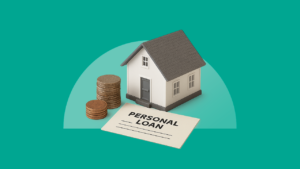What is the average credit score for personal loans?




Key takeaways
- You’ll typically need a credit score of at least 580 to qualify for a personal loan, but the higher your score, the more affordable your loan rate.
- Lenders want to see that loan applicants have a history of responsibly paying debt, and your credit score provides a window into your past behavior.
- The FICO credit scoring system ranges from 300 to 850, and is used by most lenders.
The average FICO credit score in the U.S. was 715 in April 2025, down a few points thanks to rising student loan delinquencies. Your chances of getting a low interest personal loan rate are much higher if you have very good-to-excellent credit (740+), at least as compared to those in the fair-to-good credit range (580 to 739).
When you apply for a personal loan, your credit score is one of the most important factors lenders consider. Understanding how your score impacts your loan — and what you can do to improve it — can help you secure the most affordable financing possible.
What credit score is needed for a personal loan?
If your credit score is in the 800-plus range, you’ll have the best chance at securing a lender’s lowest advertised rates, the largest loan amounts and the most flexible repayment terms. However, you might still qualify for a lender’s best personal loan rates or terms with a FICO score of 740 or higher.
Since each lender sets its own eligibility requirements, the credit score you’ll need to qualify varies by lender. Most lenders require a minimum score of around 580 to qualify, but of course you’d be quoted less competitive rates and terms.
Here are a few examples from popular lenders:
| Lender | APR range | Minimum credit score |
|---|---|---|
| Upgrade | 7.74%-35.99% | 600 |
| Avant | 9.95%-35.99% | 550 |
| Happy Money | 7.95%-35.99% | 640 |
| SoFi | 7.74%-35.49% | 300 |
| Upstart | 6.50%-35.99% | 300 |
| Best Egg | 6.99%-35.99% | 600 |
| LightStream | 6.49%-24.89% | 660 |
If you need to borrow a personal loan but don’t have good credit, work to improve your credit score before comparing lenders. Boosting your score will result in lower rates and interest savings.
Personal loans for bad credit
Bad credit personal loans are designed for borrowers with poor credit, and lenders may place more emphasis on your income, employment history or education to determine your eligibility. But if you have bad credit, you can expect higher interest rates, lower loan amounts and fewer lender options.
Generally, the minimum credit score needed to qualify for a personal loan is 580, though some lenders accept scores as low as 300. If you qualify, ensure that you can afford to repay the loan as agreed. You should also watch for signs of predatory lending by verifying a lender’s credentials and checking borrower reviews before applying.
How does your credit score affect your personal loan rate?
Your credit score is one of the most important factors lenders use to set your personal loan rate. Borrowers with higher scores can typically access rates lower than the average personal loan rate, resulting in significant savings over the life of the loan.
Consider this example, in which two borrowers with differing credit apply for the same $10,000 loan repaid over five years. The monthly payments and interest paid have been rounded to the nearest dollar.
| Borrower profile | APR | Monthly payment | Total interest paid |
|---|---|---|---|
| Very good credit (740+) | 6.99% | $198 | $1,878 |
| Poor credit (<579) | 35.99% | $361 | $11,676 |
| Difference | $163 | $9,798 |
Over the life of the loan, the borrower with good credit will save close to $9,800 in interest charges. This is why it’s crucial to take the time to increase your credit score before borrowing.
What to consider before applying
Before applying for a personal loan:
- Check your credit score. Know where you stand so you can gauge what rates you’ll likely qualify for. Your bank or credit card issuer — and some third-party platforms — may offer free access, or you can check your score with the credit bureaus for a fee.
- Compare lenders. Look for the best personal loan rates, including competitive APRs, low fees and favorable terms.
- Read the fine print. Understand all costs, including origination fees or restrictions.
- Prequalify when possible. Soft credit checks allow you to estimate rates without hurting your score.
- Calculate affordability. Use a personal loan calculator to ensure the monthly payments fit your budget.
How to build your credit
Improving your credit before applying for a personal loan can boost your approval odds and lower your interest rate.
- Pay down existing debt. Keeping your credit utilization below 30 percent of your credit limit can improve your credit score. If you have balances above that threshold, focus on paying them down to help improve your score.
- Make on-time payments. Consistently making on-time payments on your credit cards and other loans, like a mortgage or auto loan, is one of the best ways to build your credit score quickly.
- Open a secured credit card. If you don’t qualify for a traditional credit card, a secured card can be a great alternative. To establish the credit line, you make an upfront cash deposit that serves as your credit limit. As you borrow against the line and repay the balance, your responsible repayment will boost your score.
- Become an authorized user. Piggybacking on a family member’s strong credit history by becoming an authorized user on the card can also help increase your credit score. But be careful — if they max out their card or fail to make the payments, your score will be damaged.
- Review your credit reports. Check for errors or inaccuracies that may be dragging down your score. If you discover a mistake on your report, dispute the error with the reporting credit bureau.
Bottom line
Before taking out a personal loan, check your credit score and have a clear understanding of your overall financial health. Consider the APRs offered, compare lender requirements and calculate your monthly payments based on what you’re eligible for.
To minimize damage to your credit score, prequalify with at least three lenders. Review the loan terms carefully before selecting the best lender for your needs.
Why we ask for feedback Your feedback helps us improve our content and services. It takes less than a minute to complete.
Your responses are anonymous and will only be used for improving our website.
You may also like

How much can you borrow with a startup business loan?

Can I get a personal loan to buy a house?

How much of a personal loan can I get in 2025?

